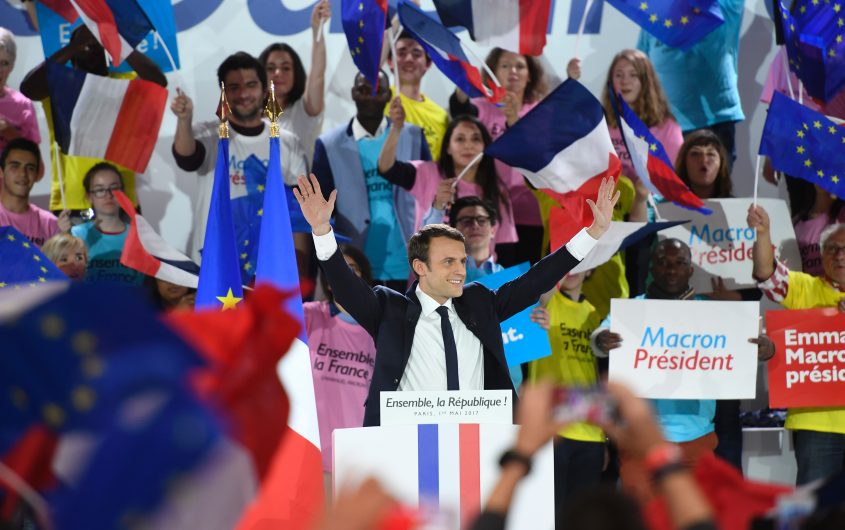
ERIC FEFERBERG/AFP/Getty Images
Pragmatic France Elects a Reformer

Peter S. Rashish
Vice President; Director, Geoeconomics Program
Peter S. Rashish, who counts over 30 years of experience counseling corporations, think tanks, foundations, and international organizations on transatlantic trade and economic strategy, is Vice President and Director of the Geoeconomics Program at AICGS. He also writes The Wider Atlantic blog.
Mr. Rashish has served as Vice President for Europe and Eurasia at the U.S. Chamber of Commerce, where he spearheaded the Chamber’s advocacy ahead of the launch of the Transatlantic Trade and Investment Partnership. Previously, Mr. Rashish was a Senior Advisor for Europe at McLarty Associates, Executive Vice President of the European Institute, and a staff member and consultant at the International Energy Agency, the World Bank, UNCTAD, the Atlantic Council, the Bertelsmann Foundation, and the German Marshall Fund.
Mr. Rashish has testified before the House Financial Services Subcommittee on International Monetary Policy and Trade and the House Foreign Affairs Subcommittee on Europe and Eurasia and has advised three U.S. presidential campaigns. He has been a featured speaker at the Munich Security Conference, the Aspen Ideas Festival, and the Salzburg Global Seminar and is a member of the Board of Directors of the Jean Monnet Institute in Paris and a Senior Advisor to the European Policy Centre in Brussels. His commentaries have been published in The New York Times, the Financial Times, The Wall Street Journal, Foreign Policy, and The National Interest, and he has appeared on PBS, CNBC, CNN, NPR, and the BBC.
He earned a BA from Harvard College and an MPhil in international relations from Oxford University. He speaks French, German, Italian, and Spanish.
There is an old story about the serious French thinker who, when presented with a common-sense solution to a problem, will find fault by retorting that the idea “works in practice but not in theory.” And there is some truth to the notion that in the land of Descartes, logical clarity bordering on ideological rigidity has had more of a hold on voters than in most Western democracies.
No more. With the election yesterday by a nearly two to one margin of the liberal, centrist candidate Emmanuel Macron over the far-right, nationalist Marine Le Pen as President of France, the French have made a strong choice in favor of pragmatic, flexible, and bottom-up governance. A form of leadership that will start with values, agreements, and institutions that exist—economic openness, the euro, the European Union—and reform and redefine them in ways that help the French to master the challenges of globalization more effectively.
To put the French election in context, the Brexit vote last June in the UK to leave the European Union (“Take Back Control”) and the U.S. presidential election in November (“America First”) were widely seen as the start of a wave of nationalist withdrawal from international commitments. But in the subsequent electoral tests in Austria, the Netherlands, and most important of all, now in France, the far right has been defeated. There has been a welcome return to a realism based on the idea that international engagement with like-minded countries is the only way to foster security and prosperity in an interconnected world.
One defining theme of Macron’s campaign was the rejection of Le Pen’s idea that a reassertion of French independence would be the magic bullet to solve the country’s problems. What Macron understands—and what British Brexiteers do not—is that maximizing de jure sovereignty is no guarantee of greater national security or prosperity. It is important to ask: will the UK be more or less able to defend itself against cyberattacks or terrorist threats once it is outside the EU? Would the freedom not to be subject to decisions of the European Court of Justice really compensate the economic losses from pulling out of the EU’s single market, customs union, and free trade agreements?
As Germany’s chancellor Angela Merkel heads into her own federal elections in September she will feel she has the wind at her back with the victory of Macron across the Rhine. Whether she or her Social Democratic rival Martin Schulz wins in Germany, there is an important opportunity to reignite the Franco-German motor that has historically been responsible for progress in the European Union. Macron is likely to embark upon politically unpopular reforms to French labor, product, and services markets once he takes office. While these steps to make France more innovation-friendly will boost its economic output in the long run, in the short run they could depress growth. Macron will need all the help he can get from Germany, both in terms of policies and political communication, to ensure his success. Failure is not an option.









